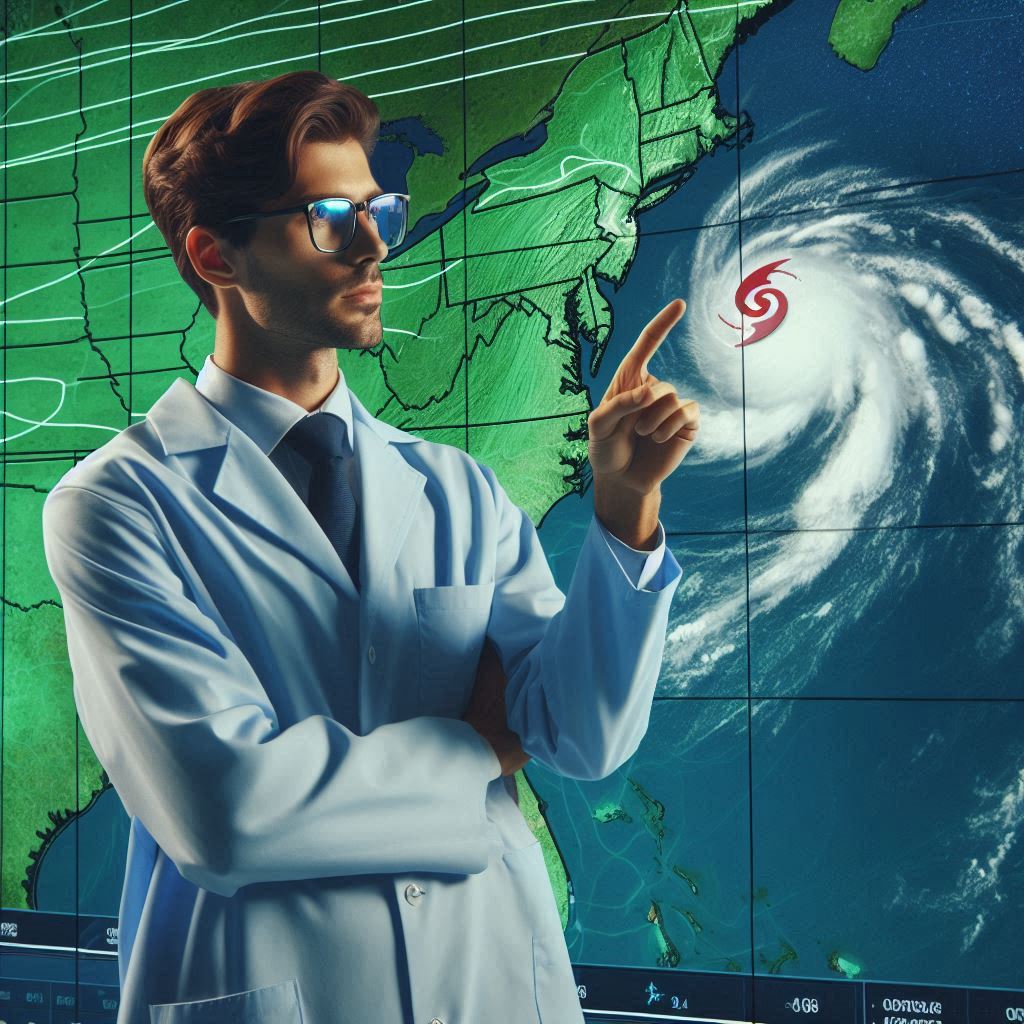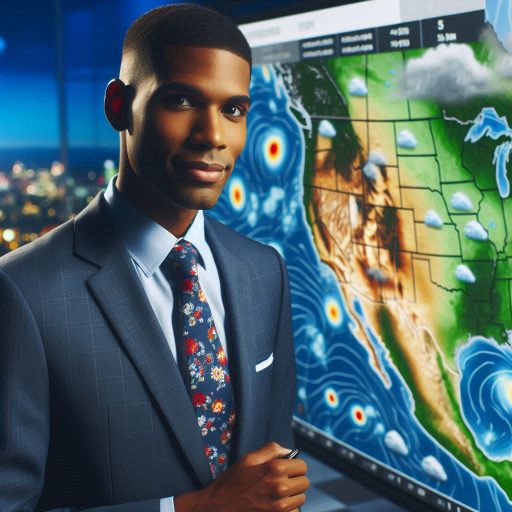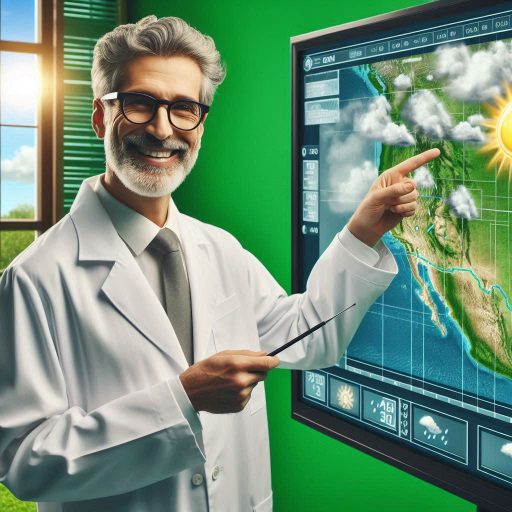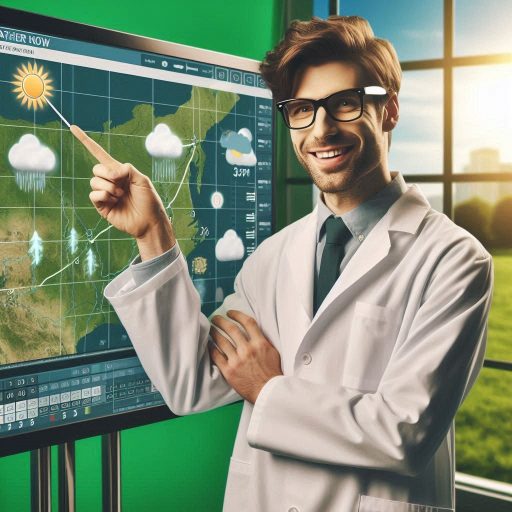Introduction
Meteorologists are scientists who specialize in studying the atmosphere and its various phenomena.
They focus on understanding weather patterns, atmospheric conditions, and climate trends to provide accurate weather forecasts.
Their work involves analyzing data collected from a variety of sources, including weather stations, satellites, radars, and even ocean buoys.
By interpreting this complex information, meteorologists can predict short-term weather changes, such as daily forecasts, as well as long-term climate shifts that may occur over months or years.
They employ advanced modeling techniques to simulate atmospheric conditions, helping to improve the accuracy of their predictions.
The importance of weather forecasting in daily life cannot be overstated.
Accurate predictions empower individuals and communities to prepare for various weather conditions, ensuring safety and minimizing disruptions.
For instance, timely alerts about severe weather events like hurricanes, tornadoes, or blizzards can save lives and protect property.
Communities can take necessary precautions, such as evacuation orders or resource allocation, to mitigate the impact of extreme weather.
Moreover, businesses rely heavily on accurate weather forecasts to optimize their operations.
Industries such as agriculture depend on meteorological data to make informed decisions about planting and harvesting crops.
Farmers use forecasts to determine the best times to apply fertilizers or pesticides, ensuring that they maximize yields while minimizing waste.
Education and Training
Bachelor’s Degree in Meteorology or Related Field
Becoming a meteorologist requires a strong educational foundation.
Most meteorologists hold a bachelor‘s degree in meteorology or a closely related field.
This degree provides essential knowledge in atmospheric science, weather patterns, and climate systems.
Courses typically include physics, mathematics, and computer science, equipping students with necessary skills.
Practical experience in data collection and analysis is often part of the curriculum, enhancing employability.
Additional Certifications or Licenses May Be Required
While a bachelor’s degree is crucial, additional certifications can enhance a meteorologist’s career.
The American Meteorological Society (AMS) offers a Certified Broadcast Meteorologist (CBM) credential.
This certification validates a meteorologist’s ability to communicate weather information effectively.
Similarly, the National Weather Association (NWA) offers a seal of approval for broadcast meteorologists.
Earning these credentials can open doors to advanced job opportunities.
Some states may also require specific licenses for meteorologists working in public service or broadcasting.
Ongoing Professional Development to Stay Current in the Field
Ongoing professional development is essential in meteorology.
Weather patterns and climate science continuously evolve, requiring meteorologists to stay updated on the latest research.
Attending conferences, workshops, and webinars provides valuable insights into emerging trends and technologies.
These opportunities allow meteorologists to network with peers and experts, fostering collaboration and knowledge sharing.
Additionally, online courses and certifications are increasingly popular for continuing education.
Meteorologists can explore platforms offering specialized training in topics such as climate change, extreme weather events, or advanced forecasting techniques.
Engaging in continuous learning helps professionals remain competitive and knowledgeable in their field.
Internships and entry-level positions provide valuable hands-on experience.
Many meteorologists begin their careers as weather interns at local stations or government agencies.
These roles offer practical experience in data collection, analysis, and presentation.
Gaining experience in real-world settings helps build essential skills and enhances job readiness.
Professional organizations also play a vital role in a meteorologist’s career development.
Membership in organizations like the AMS or NWA provides access to resources, publications, and networking opportunities.
These organizations often offer training programs and webinars, promoting continuous education within the field.
Aspiring meteorologists must focus on obtaining a relevant degree and pursuing additional certifications.
Ongoing professional development is crucial to maintaining knowledge and skills.
With dedication and the right educational path, individuals can successfully navigate a career in meteorology.
Read: Top Skills Needed for a Successful Geology Career
Duties
Analyzing and Interpreting Weather Data
One of the primary duties of a meteorologist is analyzing and interpreting weather data.
Meteorologists collect data from various sources, including weather stations, satellites, and radar systems.
They evaluate temperature, humidity, wind speed, and atmospheric pressure to understand current conditions.
By analyzing this data, they can identify patterns and trends that inform weather predictions.
This task requires strong analytical skills and a deep understanding of meteorological principles.
Using Computer Models to Forecast Weather Patterns
Meteorologists rely heavily on computer models to forecast weather patterns.
These models simulate the atmosphere and predict future weather conditions.
Meteorologists input data into these models to generate forecasts.
They analyze the outputs and adjust predictions based on real-time observations.
Understanding and utilizing these complex models is crucial for accurate forecasting.
Meteorologists must stay updated on advancements in technology to improve their forecasting accuracy.
Advising on Potential Weather Hazards
Meteorologists play a vital role in advising the public and organizations about potential weather hazards.
They assess the severity and impact of weather events, such as storms, floods, and heatwaves.
Based on their analyses, they issue warnings and alerts to keep communities safe.
This advisory role is critical, as timely information can help individuals and businesses prepare for adverse weather conditions.
Effective communication skills are essential for conveying complex information clearly.
Collaborating with Other Professionals in the Field
Collaboration with other professionals is another important duty of meteorologists.
They often work alongside climatologists, hydrologists, and environmental scientists.
This teamwork allows for a comprehensive understanding of weather and climate interactions.
Meteorologists may also collaborate with emergency management agencies to develop response strategies for severe weather events.
By sharing insights and expertise, these professionals enhance the overall effectiveness of weather forecasting and hazard management.
Meteorologists analyze weather data, use computer models for forecasts, advise on weather hazards, and collaborate with other experts.
These duties require a combination of technical skills, analytical thinking, and effective communication.
As weather patterns become increasingly complex due to climate change, the role of meteorologists will continue to be vital in safeguarding communities and enhancing public safety.
Read: The Future of Botany: Emerging Fields and Innovations
Responsibilities
Issuing Weather Alerts and Warnings
One of the key responsibilities of a meteorologist is issuing weather alerts and warnings.
When severe weather threatens, meteorologists assess the situation and determine the potential impact.
They communicate critical information to the public, ensuring that individuals and organizations can take necessary precautions.
Timely alerts can save lives and minimize property damage, making this responsibility vital for public safety.
Providing Weather Updates for Media Outlets
Meteorologists frequently provide weather updates for various media outlets.
They prepare reports for television, radio, and online platforms, translating complex meteorological data into understandable language.
These updates inform the public about current conditions, forecasts, and severe weather warnings.
Meteorologists must adapt their communication style to different audiences, ensuring that their message reaches everyone effectively.
Researching and Documenting Weather Patterns
Researching and documenting weather patterns is another important responsibility.
Meteorologists study historical weather data to identify trends and changes over time.
This research informs climate studies and helps predict future weather events.
By documenting these patterns, meteorologists contribute to a greater understanding of climate change and its effects on local and global scales.
Conducting Field Research to Gather Data
Conducting field research is a crucial aspect of a meteorologist’s responsibilities.
This involves gathering data directly from the environment during weather events.
Meteorologists may deploy instruments to measure temperature, wind speed, and precipitation in real-time.
This hands-on research enhances the accuracy of forecasts and provides valuable insights into weather phenomena.
Field research often requires working in challenging conditions, demonstrating the commitment meteorologists have to their profession.
Meteorologists have a range of responsibilities that ensure public safety and enhance our understanding of weather patterns.
From issuing alerts and providing media updates to researching climate trends and conducting field studies, their work is essential.
These responsibilities demand a combination of scientific knowledge, communication skills, and dedication to public service.
As weather-related challenges continue to evolve, meteorologists will remain at the forefront of safeguarding communities and informing the public.
Read: What Does a Geologist Do? Career Overview and Insights
Skills and Qualities
Strong Analytical Skills
Meteorologists must possess strong analytical skills to interpret complex weather data effectively.
They analyze large sets of data from various sources, including satellites and weather stations.
This analysis helps them identify patterns and make accurate forecasts.
Critical thinking allows meteorologists to assess different scenarios and determine the best course of action.
Strong analytical abilities are essential for problem-solving and making informed decisions in a rapidly changing environment.
Attention to Detail
Attention to detail is another crucial quality for meteorologists.
Small discrepancies in data can lead to significant differences in weather predictions.
Meteorologists must meticulously examine data inputs and outputs to ensure accuracy.
This attention to detail extends to their reports, where clarity and precision are vital for public understanding.
By being thorough in their work, meteorologists can enhance the reliability of their forecasts.
Excellent Communication Skills
Excellent communication skills are essential for meteorologists to convey complex information clearly.
They must explain intricate meteorological concepts in a way that the general public can understand.
Whether issuing weather alerts or providing updates to media outlets, meteorologists need to be articulate and engaging.
Strong communication fosters trust and ensures that vital information reaches the audience effectively.
This skill is particularly important during severe weather events when timely and accurate information can save lives.
Ability to Work Under Pressure
Meteorologists often work under pressure, especially during severe weather events.
They must quickly analyze data, make forecasts, and communicate warnings to the public.
This high-stakes environment requires calmness and focus to ensure accurate and timely responses.
Meteorologists must adapt to rapidly changing conditions while maintaining clarity in their communications.
The ability to work under pressure is essential for making critical decisions during emergencies.
Meteorologists need a diverse set of skills and qualities to excel in their roles.
Strong analytical skills and attention to detail enable them to interpret data accurately.
Excellent communication skills help them convey vital information clearly, while the ability to work under pressure ensures effective responses during severe weather events.
These skills and qualities are fundamental to their success and play a critical role in public safety and weather forecasting.
As the field of meteorology continues to evolve, these competencies will remain essential for meeting the challenges ahead.
Read: Educational Path: Becoming a Geologist in the USA
Transform Your Career Today
Unlock a personalized career strategy that drives real results. Get tailored advice and a roadmap designed just for you.
Start Now
Discover More: Materials Scientist: Job Satisfaction and Work-Life Balance
Work Environment
Employment in Government Agencies, Research Institutions, or Private Industry
Meteorologists find employment in various sectors, including government agencies, research institutions, and private industry.
Many work for national meteorological services, such as the National Weather Service (NWS) in the United States.
These positions focus on weather forecasting, public safety, and environmental monitoring.
Research institutions often employ meteorologists to study climate patterns and develop new forecasting models.
Additionally, private companies, including television stations and consulting firms, hire meteorologists to provide weather information and analysis for diverse audiences.
Varied Schedule, Including Nights and Weekends
The work schedule for meteorologists can be varied and unpredictable.
Many meteorologists work shifts that include nights, weekends, and holidays.
Weather events do not adhere to a standard work schedule, and meteorologists must be available to monitor conditions at all times.
This flexibility is essential for issuing timely alerts and updates during severe weather situations.
While the varied schedule can be demanding, it also provides opportunities for meteorologists to experience different aspects of their work.
Work Can Be Physically Demanding at Times
The nature of meteorological work can sometimes be physically demanding.
Field research, which involves gathering data during weather events, often requires meteorologists to be outdoors in various conditions.
They may face extreme temperatures, rain, or wind while collecting data.
Additionally, setting up equipment or conducting surveys in challenging environments can be physically taxing.
Meteorologists must maintain a level of physical fitness to handle these demands effectively.
The work environment for meteorologists is diverse and dynamic.
They can find employment in government, research, or private sectors, each offering unique challenges and opportunities.
The varied schedule, including nights and weekends, is necessary for effective weather monitoring and forecasting.
At times, the work can also be physically demanding, particularly during field research.
Meteorologists must adapt to these conditions, balancing the demands of their profession with the need for accurate and timely weather information.
As the field evolves, meteorologists will continue to play a vital role in understanding and communicating weather phenomena.
Discover More: A Day in the Life of a Soil Scientist
Salary and Job Outlook
Median Salary for Meteorologists
The median salary for meteorologists varies based on factors such as experience, education, and geographic location.
As of recent data, the median annual salary for meteorologists in the United States is approximately $100,000.
Entry-level positions typically offer lower salaries, while experienced meteorologists can earn significantly more.
Those working in private industry or high-demand areas may see higher compensation than their counterparts in government roles.
Job Growth Projection for the Field
The job growth projection for meteorologists is promising.
The U.S. Bureau of Labor Statistics anticipates a growth rate of around 8% for meteorologist positions over the next decade.
This growth reflects the increasing demand for accurate weather forecasting and climate-related research.
Factors contributing to this demand include the rising frequency of extreme weather events and the need for climate data to inform policy decisions.
As awareness of climate change continues to grow, meteorologists will remain essential in various sectors.
Potential for Advancement or Specialization Within the Field
Meteorologists have various opportunities for advancement and specialization within the field.
Many begin their careers in entry-level forecasting positions and can progress to senior meteorologist roles with experience.
Additionally, meteorologists can specialize in areas such as climatology, atmospheric research, or environmental consulting.
Pursuing advanced degrees or certifications can enhance career prospects and open doors to leadership positions.
Furthermore, meteorologists can transition into related fields, such as emergency management or environmental policy.
The versatility of meteorology allows professionals to explore diverse career paths based on their interests and skills.
Networking within professional organizations, such as the American Meteorological Society, can provide valuable connections and opportunities for growth.
The salary and job outlook for meteorologists are encouraging.
With a median salary around $100,000 and a projected job growth rate of 8%, this field offers stability and potential.
Meteorologists can pursue various pathways for advancement or specialization, making it a dynamic and rewarding career choice.
As climate-related challenges become more prominent, the role of meteorologists will continue to be vital in shaping our understanding of weather and its impacts.
Conclusion
Meteorologists play a vital role in society by analyzing weather data and predicting atmospheric conditions.
Their duties encompass a range of activities, including collecting data from weather stations, satellites, and radars.
They interpret complex meteorological data to generate accurate forecasts, ensuring timely communication of weather information to the public.
Additionally, meteorologists develop models that simulate weather patterns and conduct research to improve forecasting techniques and methodologies.
Accurate weather forecasting is essential for public safety and economic stability.
It helps communities prepare for severe weather, reducing the risk of damage and loss of life.
For example, timely warnings about hurricanes or tornadoes can save lives and minimize destruction.
Moreover, businesses rely on precise forecasts to make informed decisions regarding operations, logistics, and resource allocation.
From agriculture to transportation, various industries depend on meteorologists to provide insights that impact their daily activities and long-term planning.
For those interested in pursuing a career in meteorology, there are numerous opportunities to explore.
Educational programs in atmospheric sciences provide the necessary skills and knowledge for aspiring meteorologists.
Engaging with professional organizations can offer valuable resources, mentorship, and networking opportunities.
Many meteorologists also participate in community outreach, educating the public about weather-related issues and the importance of preparation.




